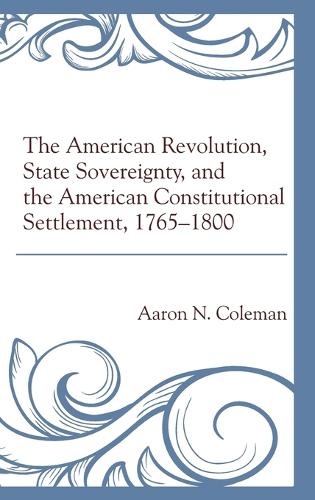
The American Revolution, State Sovereignty, and the American Constitutional Settlement, 17651800
(Hardback)
Available Formats
Publishing Details
The American Revolution, State Sovereignty, and the American Constitutional Settlement, 17651800
By (Author) Aaron N. Coleman
Bloomsbury Publishing PLC
Lexington Books
4th March 2016
United States
Classifications
Tertiary Education
Non Fiction
Early modern warfare (including gunpowder warfare)
History of the Americas
Constitution: government and the state
973.3
Physical Properties
Hardback
272
Width 159mm, Height 239mm, Spine 25mm
590g
Description
Tracing the political, ideological, and constitutional arguments from the imperial crisis with Britain and the drafting of the Articles of Confederation to the ratification of the Constitution and the political conflict between Federalists and Jeffersonians, The American Revolution, State Sovereignty, and the American Constitutional Settlement, 17651800 reveals the largely forgotten importance of state sovereignty to American constitutionalism. Contrary to modern popular perceptions and works by other academics, the Founding Fathers did not establish a constitutional system based upon a national popular sovereignty nor a powerful national government designed to fulfill a grand philosophical purpose. Instead, most Americans throughout the period maintained that a constitutional order based upon the sovereignty of states best protected and preserved liberty. Enshrining their preference for state sovereignty in Article II of the Articles of Confederation and in the Tenth and Eleventh Amendments to the federal constitution, Americans also claimed that state interpositionthe idea that the states should intervene against any perceived threats to liberty posed by centralizationwas an established and accepted element of state sovereignty.
Reviews
A valuable contribution to the study of early American political thought, [this book] seeks to rescue the tradition of state sovereignty from the "taint" attached to it.... I highly recommend Aaron Coleman's book--not just as a work of interesting and original research, but as a useful corrective to the bent of those "nationalist historians" who see in this period the inevitable working out of national triumph over state authority. * Claremont Review of Books *
Coleman has done a great service to the prestige of the academic community.... For once, an academic book has bucked the groupthink so pervasive in the ivory tower and has given us room to hope. Too bad...[some] will inevitably dismiss it as some 'originalist' fantasy. That will say more about them than it does about Colemans skill as a historian or his attention to detail both of which are exemplary, as is his book. * The Abbeville Blog *
[This book] is an important contribution to our understanding of the founding era. * Journal of American History *
To say that Colemans painstaking reconstruction of the early Republics political history complicates Senator Sumners narrative doesnt even begin to capture his achievement. Sumner, like so many others then and since, placed the purpose-driven nation at the center of the American story. Coleman re-centers that story by turning the advocates of state sovereignty into the dominant voice and Nationalists into, if not an aberration, then at least into a worrisome challenger to what a large number of patriots thought American liberty and self-government were all about.... If Coleman had achieved nothing more than a rhetorical paradigm shift, his book would be well worth reading. But he has achieved more. Coleman has turned the controversy over state sovereignty back into what philosopher William James called a live question. * University Bookman *
Properly understanding the American constitutional founding is both vital and difficult. Professor Coleman has mastered the large and complex literature of the subject and given us a refreshing new perspective. It turns out that, after all, the role of the States was more important than we have been led to believe. -- Clyde N. Wilson, University of South Carolina
Aaron N. Coleman's new book on the place of state sovereignty in the Founders' federal system makes clear again what everyone once knew: that 'No taxation without representation' was a claim to government by the state legislatures whose power was primary when the Imperial Crisis began, and that the U.S. Constitution was sold as perpetuating that principle. Contrary to today's trendy teaching, Alexander Hamilton, John Marshall, and their fellow nationalists lost the battle over the Constitution in 178790, and today's system amounts to an inversion of what the Revolution was intended to establish. -- Kevin R. C. Gutzman, Western Connecticut State University, author of James Madison and the Making of America
This groundbreaking book allows readers to understand the Founders vision for the American Republic with greater accuracy and scrupulousness than previously available, and while the scholarship of myriad historians and political theorists are critiqued with great care, this study recovers the authentic basis for the political compact and the perpetuation of the regime. The book constitutes a significant accomplishment. -- H. Lee Cheek Jr., East Georgia State College
Nathan Coleman treads new ground in the history of the United States under the Articles of Confederation. By purposefully avoiding the standard nationalist narrative of the Founding era, Coleman successfully challenges a number of long-held assumptions about the origin of American constitutionalism. He boldly explains deep disagreements among American local and national leadersmany long since forgotten or overshadowed by those we venerate today. In doing so, Coleman sheds new light on early commitments to states rights, the purpose of political independence, the initial goals of the American union, and concerns about the sustainability of the Articles of Confederation. -- Carey M. Roberts, Liberty University
Author Bio
Aaron N. Coleman is associate professor of history and higher education at the University of the Cumberlands.
